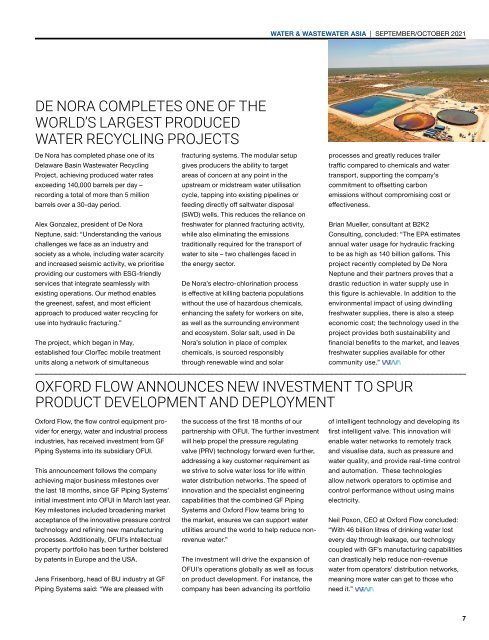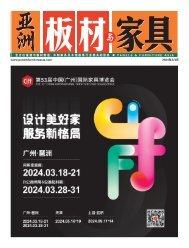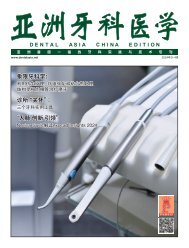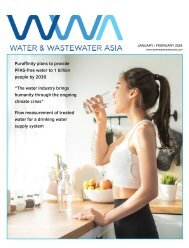Water & Wastewater Asia September/October 2021
Water & Wastewater Asia is an expert source of industry information, cementing its position as an indispensable tool for trade professionals in the water and wastewater industry. As the most reliable publication in the region, industry experts turn this premium journal for credible journalism and exclusive insight provided by fellow industry professionals. Water & Wastewater Asia incorporates the official newsletter of the Singapore Water Association (SWA).
Water & Wastewater Asia is an expert source of industry information, cementing its position as an indispensable tool for trade professionals in the water and wastewater industry. As the most reliable publication in the region, industry experts turn this premium journal for credible journalism and exclusive insight provided by fellow industry professionals. Water & Wastewater Asia incorporates the official newsletter of the Singapore Water Association (SWA).
Create successful ePaper yourself
Turn your PDF publications into a flip-book with our unique Google optimized e-Paper software.
WATER & WASTEWATER ASIA | SEPTEMBER/OCTOBER <strong>2021</strong><br />
DE NORA COMPLETES ONE OF THE<br />
WORLD’S LARGEST PRODUCED<br />
WATER RECYCLING PROJECTS<br />
De Nora has completed phase one of its<br />
Delaware Basin <strong>Wastewater</strong> Recycling<br />
Project, achieving produced water rates<br />
exceeding 140,000 barrels per day –<br />
recording a total of more than 5 million<br />
barrels over a 30-day period.<br />
Alex Gonzalez, president of De Nora<br />
Neptune, said: “Understanding the various<br />
challenges we face as an industry and<br />
society as a whole, including water scarcity<br />
and increased seismic activity, we prioritise<br />
providing our customers with ESG-friendly<br />
services that integrate seamlessly with<br />
existing operations. Our method enables<br />
the greenest, safest, and most efficient<br />
approach to produced water recycling for<br />
use into hydraulic fracturing.”<br />
The project, which began in May,<br />
established four ClorTec mobile treatment<br />
units along a network of simultaneous<br />
fracturing systems. The modular setup<br />
gives producers the ability to target<br />
areas of concern at any point in the<br />
upstream or midstream water utilisation<br />
cycle, tapping into existing pipelines or<br />
feeding directly off saltwater disposal<br />
(SWD) wells. This reduces the reliance on<br />
freshwater for planned fracturing activity,<br />
while also eliminating the emissions<br />
traditionally required for the transport of<br />
water to site – two challenges faced in<br />
the energy sector.<br />
De Nora’s electro-chlorination process<br />
is effective at killing bacteria populations<br />
without the use of hazardous chemicals,<br />
enhancing the safety for workers on site,<br />
as well as the surrounding environment<br />
and ecosystem. Solar salt, used in De<br />
Nora’s solution in place of complex<br />
chemicals, is sourced responsibly<br />
through renewable wind and solar<br />
processes and greatly reduces trailer<br />
traffic compared to chemicals and water<br />
transport, supporting the company’s<br />
commitment to offsetting carbon<br />
emissions without compromising cost or<br />
effectiveness.<br />
Brian Mueller, consultant at B2K2<br />
Consulting, concluded: “The EPA estimates<br />
annual water usage for hydraulic fracking<br />
to be as high as 140 billion gallons. This<br />
project recently completed by De Nora<br />
Neptune and their partners proves that a<br />
drastic reduction in water supply use in<br />
this figure is achievable. In addition to the<br />
environmental impact of using dwindling<br />
freshwater supplies, there is also a steep<br />
economic cost; the technology used in the<br />
project provides both sustainability and<br />
financial benefits to the market, and leaves<br />
freshwater supplies available for other<br />
community use.”<br />
OXFORD FLOW ANNOUNCES NEW INVESTMENT TO SPUR<br />
PRODUCT DEVELOPMENT AND DEPLOYMENT<br />
Oxford Flow, the flow control equipment provider<br />
for energy, water and industrial process<br />
industries, has received investment from GF<br />
Piping Systems into its subsidiary OFUI.<br />
This announcement follows the company<br />
achieving major business milestones over<br />
the last 18 months, since GF Piping Systems’<br />
initial investment into OFUI in March last year.<br />
Key milestones included broadening market<br />
acceptance of the innovative pressure control<br />
technology and refining new manufacturing<br />
processes. Additionally, OFUI’s intellectual<br />
property portfolio has been further bolstered<br />
by patents in Europe and the USA.<br />
Jens Frisenborg, head of BU industry at GF<br />
Piping Systems said: “We are pleased with<br />
the success of the first 18 months of our<br />
partnership with OFUI. The further investment<br />
will help propel the pressure regulating<br />
valve (PRV) technology forward even further,<br />
addressing a key customer requirement as<br />
we strive to solve water loss for life within<br />
water distribution networks. The speed of<br />
innovation and the specialist engineering<br />
capabilities that the combined GF Piping<br />
Systems and Oxford Flow teams bring to<br />
the market, ensures we can support water<br />
utilities around the world to help reduce nonrevenue<br />
water.”<br />
The investment will drive the expansion of<br />
OFUI’s operations globally as well as focus<br />
on product development. For instance, the<br />
company has been advancing its portfolio<br />
of intelligent technology and developing its<br />
first intelligent valve. This innovation will<br />
enable water networks to remotely track<br />
and visualise data, such as pressure and<br />
water quality, and provide real-time control<br />
and automation. These technologies<br />
allow network operators to optimise and<br />
control performance without using mains<br />
electricity.<br />
Neil Poxon, CEO at Oxford Flow concluded:<br />
“With 46 billion litres of drinking water lost<br />
every day through leakage, our technology<br />
coupled with GF’s manufacturing capabilities<br />
can drastically help reduce non-revenue<br />
water from operators’ distribution networks,<br />
meaning more water can get to those who<br />
need it.”<br />
7


















